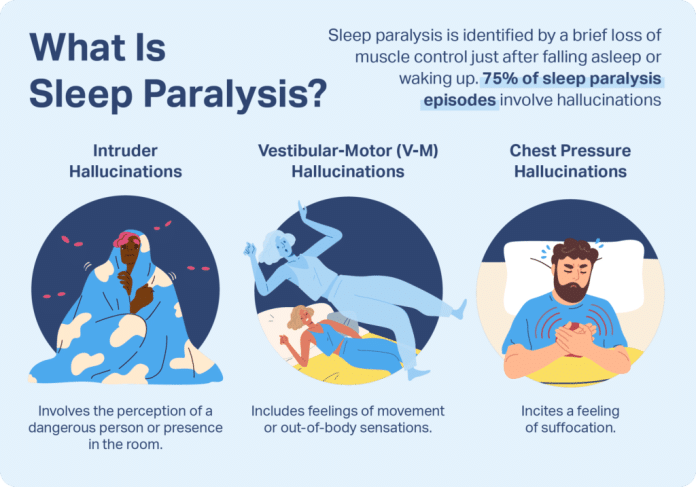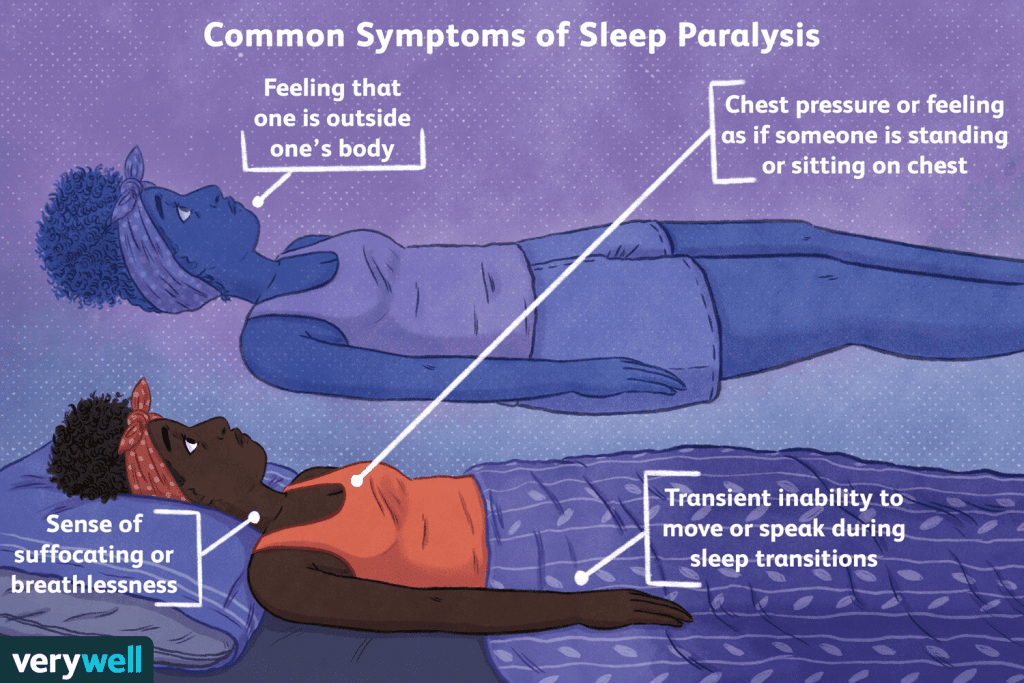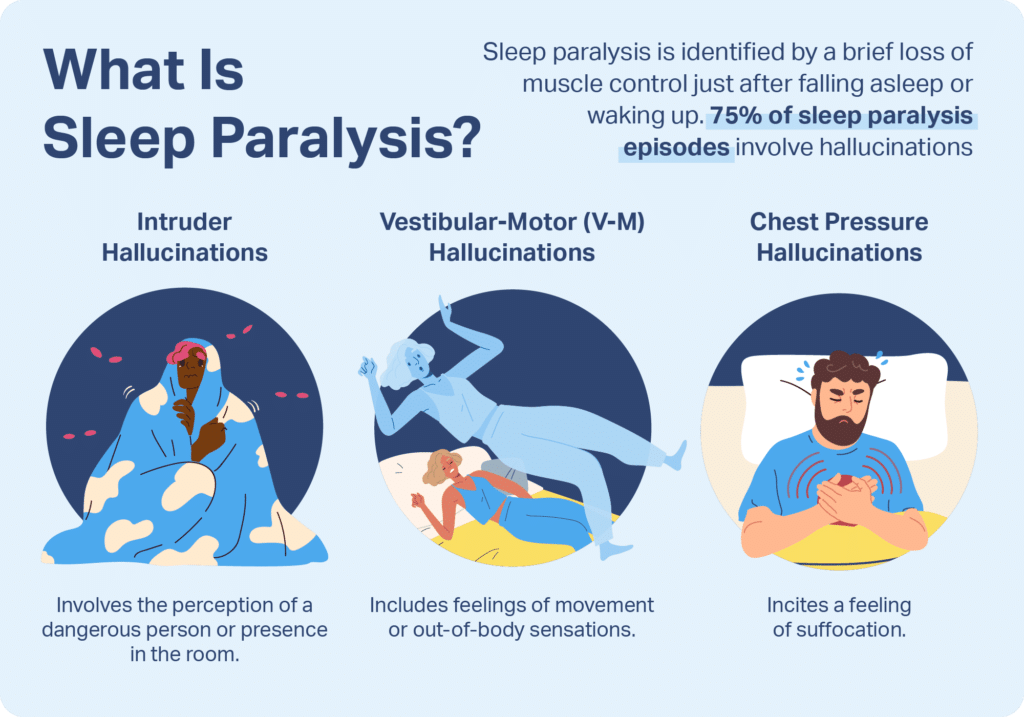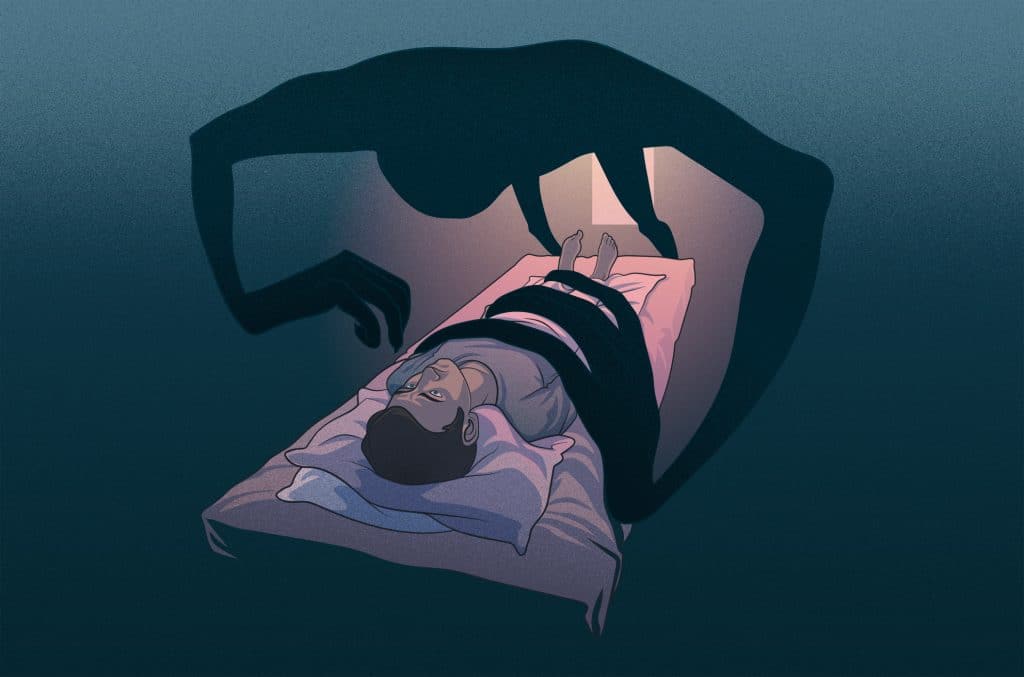Have you ever woken up in the middle of the night, unable to move and feeling a strange pressure on your chest? If so, you may have experienced sleep paralysis, a fascinating and somewhat terrifying phenomenon that affects many people around the world. Sleep paralysis occurs when the body is temporarily unable to move or speak while transitioning between sleep and wakefulness, leaving individuals feeling trapped and helpless for a brief period of time. In this article, we will explore the causes, symptoms, and possible treatments of sleep paralysis, shedding light on this peculiar and often misunderstood sleep disorder.
Review contents
What is Sleep Paralysis?
Definition
Sleep paralysis is a temporary condition that affects the ability to move or speak while transitioning into or out of sleep. It occurs when the brain and body are not in sync during sleep, resulting in a brief period of paralysis. This phenomenon can be accompanied by hallucinations and a sense of pressure, which can be quite distressing for those who experience it.
Prevalence
Sleep paralysis is more common than one might think, with research indicating that approximately 7.6% of the general population experiences it at some point in their lives. It is most commonly reported in adolescents and young adults, and it seems to affect women slightly more often than men. Despite its prevalence, many individuals experiencing sleep paralysis may feel scared or confused, as they are often unfamiliar with the condition.
This image is property of www.verywellhealth.com.
Types of Sleep Paralysis
There are different types of sleep paralysis, each with its own unique characteristics:
-
Isolated Sleep Paralysis: This type occurs infrequently and is not associated with any underlying sleep disorders. People with isolated sleep paralysis may experience it only once or twice in their lifetime.
-
Recurrent Sleep Paralysis: As the name suggests, recurrent sleep paralysis involves repeated episodes. It can occur sporadically or more frequently, and it is often associated with other sleep disorders, such as narcolepsy.
-
Hypnagogic Sleep Paralysis: Hypnagogic sleep paralysis occurs when transitioning from wakefulness to sleep. It often manifests as vivid hallucinations and a sense of pressure on the chest.
-
Hypnopompic Sleep Paralysis: In contrast to hypnagogic sleep paralysis, hypnopompic sleep paralysis occurs when transitioning from sleep to wakefulness. It can be accompanied by hallucinations and a lingering feeling of being unable to move.
Causes
The exact cause of sleep paralysis is not fully understood. However, several factors are believed to contribute to its occurrence:
-
Disruptions in Sleep Patterns: Irregular sleep patterns, such as shift work or jet lag, can increase the likelihood of experiencing sleep paralysis.
-
Sleep Disorders: Conditions like narcolepsy and sleep apnea have been associated with an increased risk of sleep paralysis. These disorders can disrupt the normal sleep cycle and lead to episodes of paralysis.
-
Sleep Deprivation: A lack of sufficient sleep can affect the brain’s ability to transition smoothly between sleep stages, potentially triggering sleep paralysis.
-
Stress and Anxiety: High levels of stress and anxiety can disrupt sleep and increase the likelihood of experiencing sleep paralysis. These emotional factors can contribute to a state of hyperarousal, making it difficult for the brain to relax during sleep.
-
Genetic Factors: There is evidence to suggest that certain genetic predispositions may make some individuals more susceptible to sleep paralysis. However, further research is needed to fully understand the genetic components at play.
-
Other Potential Triggers: Some individuals may find that certain lifestyle factors, such as alcohol or drug use, can trigger sleep paralysis. Additionally, sleep position or an uncomfortable sleep environment may contribute to its occurrence.
This image is property of www.sleepfoundation.org.
Symptoms
The primary symptom of sleep paralysis is the inability to move or speak despite being fully aware of one’s surroundings. This paralysis can last for a few seconds to several minutes. Other common symptoms include:
-
Hallucinations: Many individuals with sleep paralysis report vivid visual or auditory hallucinations. These can range from seeing shadowy figures or hearing strange sounds to experiencing sensations of floating or flying.
-
Sense of Pressure: Some people describe a feeling of pressure on their chest or body during sleep paralysis. This sensation can be unsettling and contribute to a sense of fear or panic.
-
Feeling of Fear: Sleep paralysis is often accompanied by an overwhelming sense of fear or dread. This emotional response can be quite intense and may contribute to feelings of anxiety surrounding sleep.
-
Difficulty Breathing: In some cases, individuals may experience a sensation of being unable to breathe properly during sleep paralysis. This can lead to feelings of suffocation and further exacerbate the fear and panic associated with the condition.
Duration
The length and frequency of sleep paralysis episodes can vary from person to person. Typically, an episode lasts anywhere from a few seconds to a couple of minutes. However, some individuals may experience episodes that extend beyond this typical duration. Recurrent sleep paralysis, in particular, can involve multiple episodes over a short period of time.
This image is property of upload.wikimedia.org.
Impact on Daily Life
Sleep paralysis can have a significant impact on daily life, particularly if the episodes occur frequently or are accompanied by distressing symptoms. Some of the potential impacts include:
-
Sleep Quality: The fear and anxiety surrounding sleep paralysis can lead to disrupted sleep patterns and decreased sleep quality. This can result in overall fatigue and daytime sleepiness.
-
Daytime Fatigue: The interrupted sleep caused by sleep paralysis can leave individuals feeling tired and fatigued during the day. This can affect concentration, productivity, and overall well-being.
-
Mental Health: Frequent encounters with sleep paralysis may contribute to feelings of anxiety, depression, or other mental health challenges. The fear and uncertainty associated with these episodes can take a toll on one’s psychological well-being.
-
Relationships and Social Life: Sleep disruptions caused by sleep paralysis can impact daily functioning and may pose challenges in maintaining relationships and participating in social activities. Persistent fatigue and anxiety can make it difficult to engage fully in social interactions or enjoy leisure activities.
-
Productivity and Performance: Decreased sleep quality and daytime fatigue can negatively impact performance at work, school, or other responsibilities. Lack of focus and decreased cognitive abilities can hinder productivity and overall success in various areas of life.
Diagnosis
If you suspect you are experiencing sleep paralysis, it is essential to consult a healthcare professional for an accurate diagnosis. The diagnostic process may involve:
-
Medical Evaluation: Your healthcare provider will review your medical history and conduct a physical examination to rule out any underlying medical conditions that may be contributing to your symptoms.
-
Sleep Studies: In some cases, a sleep study may be recommended to assess your sleep patterns, brain activity, and potential disruptions during sleep. This can help identify any underlying sleep disorders or patterns associated with sleep paralysis.
-
Differential Diagnosis: Sleep paralysis symptoms can sometimes overlap with other conditions, such as seizures or panic attacks. A thorough evaluation will help distinguish sleep paralysis from other potential causes.
-
Rule out Other Conditions: It is important to rule out any underlying medical or psychiatric conditions that may be causing sleep paralysis symptoms. This may involve additional testing or consultations with specialists.
This image is property of www.sleepcycle.com.
Treatment Options
While there is no specific cure for sleep paralysis, several strategies can help manage the condition and reduce its impact on daily life. Some treatment options include:
-
Sleep Hygiene: Establishing a regular sleep schedule, maintaining a comfortable sleep environment, and practicing good sleep hygiene can promote healthier sleep patterns and potentially reduce the occurrence of sleep paralysis episodes.
-
Stress Reduction: Managing stress levels through techniques such as relaxation exercises, meditation, or therapy can help decrease the likelihood of experiencing sleep paralysis. Finding healthy coping mechanisms for stress and anxiety can contribute to overall well-being and sleep quality.
-
Medications: In some cases, medication may be prescribed to manage underlying sleep disorders or related symptoms. This approach should be discussed with a healthcare provider, as it depends on individual circumstances and the potential risks and benefits of medication use.
-
Supportive Therapy: Seeking support from loved ones or joining support groups can provide a safe space to discuss experiences, share coping strategies, and gain a better understanding of sleep paralysis.
Tips for Managing Sleep Paralysis
In addition to formal treatment options, there are several self-help strategies that individuals can employ to manage sleep paralysis:
-
Establishing a Regular Sleep Schedule: Maintaining consistent sleep and wake times can help regulate the sleep cycle and potentially reduce the occurrence of sleep paralysis episodes.
-
Creating a Relaxing Sleep Environment: Designing a comfortable and calming sleep environment can promote a more restful and peaceful sleep. This may involve factors such as comfortable bedding, a dark and quiet room, and a supportive mattress.
-
Reducing Stress Levels: Engaging in stress reduction techniques, such as deep breathing exercises, mindfulness, or engaging in relaxing activities, can help manage stress levels and potentially decrease the likelihood of sleep paralysis episodes.
-
Implementing Relaxation Techniques: Practicing relaxation techniques such as progressive muscle relaxation, guided imagery, or meditation before bed can help calm the mind and prepare the body for optimal sleep.
-
Avoiding Substance Use Before Bed: Substances such as caffeine, nicotine, and alcohol can disrupt sleep patterns and increase the likelihood of sleep paralysis. It is best to avoid these substances close to bedtime.
-
Seeking Support from Loved Ones: Sharing experiences and concerns with loved ones or participating in support groups can provide emotional support and a sense of connection. Connecting with others who have had similar experiences can be empowering and help relieve anxiety surrounding sleep paralysis.
In conclusion, sleep paralysis is a temporary condition that can affect individuals during the transition between sleep and wakefulness. While it can be distressing, understanding the causes, symptoms, and available treatment options can help individuals manage its impact on daily life. By implementing strategies to promote healthy sleep and manage stress, individuals can effectively navigate sleep paralysis and strive for better sleep quality and overall well-being.
This image is property of www.verywellhealth.com.
































